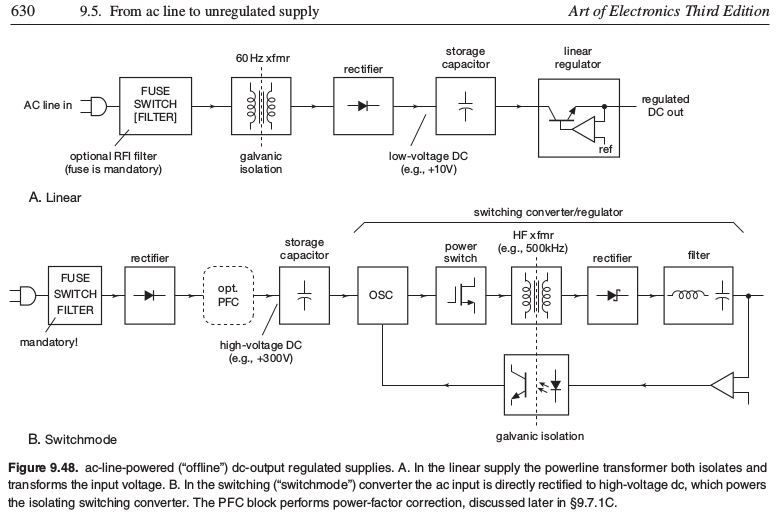Power Supply Basics: Difference between revisions
Jump to navigation
Jump to search
No edit summary |
|||
| (3 intermediate revisions by the same user not shown) | |||
| Line 6: | Line 6: | ||
[[File:switchmode.png]] | [[File:switchmode.png]] | ||
Switch mode supply requires: | Switch mode supply requires: | ||
*Ch 9 p 630 - Switch and fuse needed at AC side | *Ch 9 p 630 - Switch and fuse needed at AC side | ||
| Line 12: | Line 14: | ||
*Insulate line-voltage connections to prevent shock hazard | *Insulate line-voltage connections to prevent shock hazard | ||
*Storage capacitor - prevents ripple - | *Storage capacitor - prevents ripple - | ||
More Notes: | |||
*The term “switching converter” usually means a power converter that uses inductors (and sometimes transformers), along with high-frequency transistor switches, to carry out voltage conversion. | |||
*www.creepage.com - distance between components | |||
=Links= | |||
*[[Switch Mode Power Supply Design]] | |||
Latest revision as of 02:46, 13 April 2019
- Half wave rectifier, full wave rectifier, and full wave bridge rectifiers - [1]
- Power Supply Cookbook PDF - [2]
- Horowitz and Hill, The Art of Electronics, Ch. 9 - [3]
Art of Electronics Notes
Switch mode supply requires:
- Ch 9 p 630 - Switch and fuse needed at AC side
- Also, a filter at AC side filters possible RF from power line, using a line voltage capacitor
- Transient suppressor - a variable resistor - metal oxide varistor - shorts to ground for any high voltage spikes. It's like a high voltage, bidirectional zener diode.
- Insulate line-voltage connections to prevent shock hazard
- Storage capacitor - prevents ripple -
More Notes:
- The term “switching converter” usually means a power converter that uses inductors (and sometimes transformers), along with high-frequency transistor switches, to carry out voltage conversion.
- www.creepage.com - distance between components
